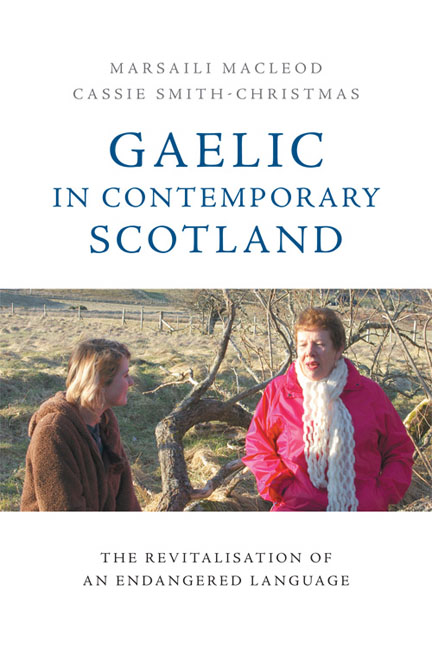Book contents
- Frontmatter
- Contents
- List of Figures
- List of Tables
- Notes on Contributors
- Foreword: Assailed yet Resolute
- Acknowledgements
- List of Abbreviations
- 1 Introduction
- 2 The Language of the Playground: Activists Building Consensus on the Language Policy and Ethos of a New Gaelic Immersion School
- 3 Mismatches between National and Local Gaelic Development: Cròileagan Dùn Èideann and the Promotion of Gaelic-medium Education
- 4 Gaelic amongst Schoolchildren: Ideas on Language Change and Linguistic Choices in Gaelic
- 5 When School is Over and Done With: Linguistic Practices and Sociodemographic Profiles of Gaelic-medium Educated Adults
- 6 New Speakers of Gaelic: A Historical and Policy Perspective
- 7 Learning Gaelic in Adulthood: Second Language Learning in Minority Language Contexts
- 8 Dlùth is Inneach: Charting Language Ideology in the Contemporary Gaelic World
- 9 Gaelic Language Use in Public Domains
- 10 Planning for Growth: The Professionalisation of the Taskforce for Gaelic Revitalisation
- 11 Organisational Language Planning: Gaelic Language Plans in the Public Sector
- 12 The Future of Gaelic Language Revitalisation in Scotland
- Index
7 - Learning Gaelic in Adulthood: Second Language Learning in Minority Language Contexts
Published online by Cambridge University Press: 18 December 2019
- Frontmatter
- Contents
- List of Figures
- List of Tables
- Notes on Contributors
- Foreword: Assailed yet Resolute
- Acknowledgements
- List of Abbreviations
- 1 Introduction
- 2 The Language of the Playground: Activists Building Consensus on the Language Policy and Ethos of a New Gaelic Immersion School
- 3 Mismatches between National and Local Gaelic Development: Cròileagan Dùn Èideann and the Promotion of Gaelic-medium Education
- 4 Gaelic amongst Schoolchildren: Ideas on Language Change and Linguistic Choices in Gaelic
- 5 When School is Over and Done With: Linguistic Practices and Sociodemographic Profiles of Gaelic-medium Educated Adults
- 6 New Speakers of Gaelic: A Historical and Policy Perspective
- 7 Learning Gaelic in Adulthood: Second Language Learning in Minority Language Contexts
- 8 Dlùth is Inneach: Charting Language Ideology in the Contemporary Gaelic World
- 9 Gaelic Language Use in Public Domains
- 10 Planning for Growth: The Professionalisation of the Taskforce for Gaelic Revitalisation
- 11 Organisational Language Planning: Gaelic Language Plans in the Public Sector
- 12 The Future of Gaelic Language Revitalisation in Scotland
- Index
Summary
Introduction
This chapter examines the learning experiences and linguistic practices of adult second language (L2) learners of Gaelic in Scotland and reflects on this group's possi-ble contribution to Gaelic revitalisation. O'Rourke and Walsh (2015: 15) argue that L2 speakers ‘are a necessary part of reversing language shift’, though are often overlooked in sociolinguistic models of language revitalisation and in practice. Whereas this might have held true in the past, in Gaelic Scotland there is now a strategic imperative to ensure greater numbers of adults learning Gaelic achieve fluency in order to help meet target increases in the crude number of Gaelic speakers in Scotland. Current Gaelic language-in-education policy aims to motivate adults to learn the language and, ultimately, to become active members of the Gaelic speech community (see Bòrd na Gàidhlig 2012). Making the transition from being an adult L2 learner to a user, or speaker, of a target language is known, however, to be a complex and non-linear process (O'Rourke and Walsh 2015; Nic Fhlannchadha and Hickey 2018). Since inter-action with target language speakers is a desirable condition for adult second language acquisition (SLA), it is argued that opportunities to practise using the language in and outside the classroom are fundamental (Norton 2013). Yet, even when the classroom experience is positive and individual motivation sustained, achieving high proficiency levels is particularly challenging in a social context which does not necessarily afford opportunities to practise the target language beyond the classroom.
This chapter reports the results from an online survey of 282 L2 learners as part of a wider study exploring the effectiveness of a classroom learning programme for Gaelic, called Ùlpan (MacLeod et al. 2015). The focus of this chapter is to understand Gaelic learner pathways and to explore their potential contribution to Gaelic language revital-isation. The results offer fresh insights into the disjuncture between the aspirations of minority language policy and the social realities of adults learning a minority language in the context of diminished place-based speaker communities. The findings also highlight the liminal space which minority language learners occupy both in practice and in contemporary theorising over adult language learning; their learner situation neither replicates the foreign language social context – despite the target language not being the typical language of communication in their immediate environment – nor the immersion learning context, in which naturalistic learning of the target language can complement classroom learning.
Information
- Type
- Chapter
- Information
- Gaelic in Contemporary ScotlandThe Revitalisation of an Endangered Language, pp. 94 - 113Publisher: Edinburgh University PressPrint publication year: 2018
